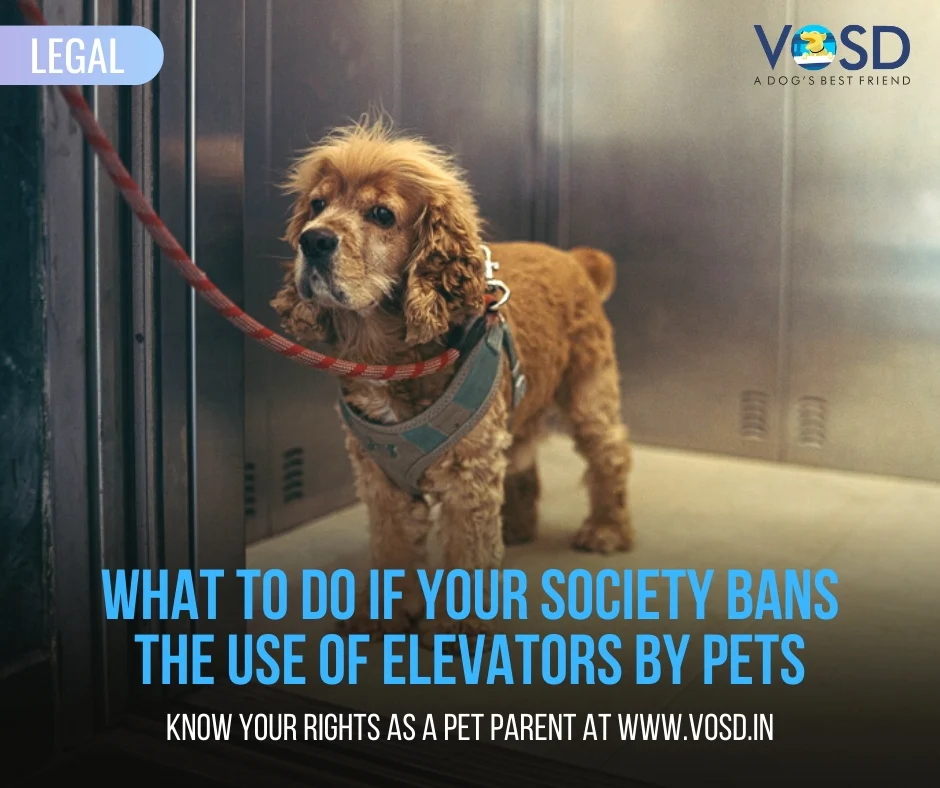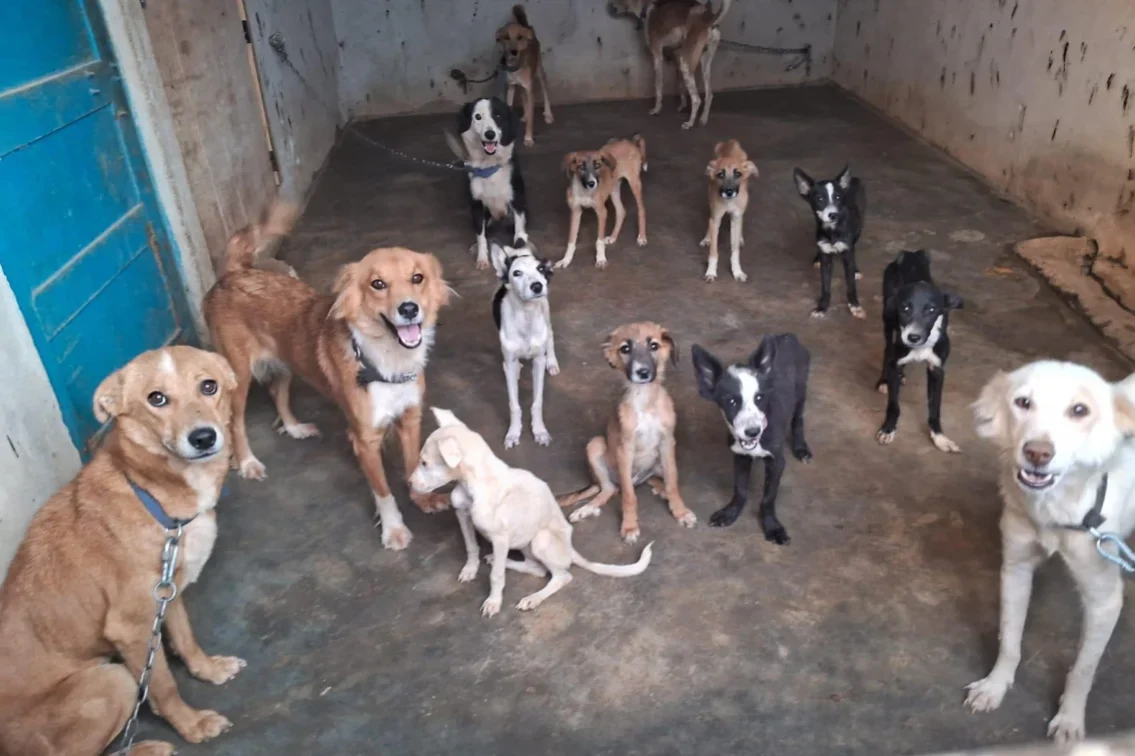Dogs in urban residential buildings are often banned from using the elevator.
In Part I, we discuss whether it is legal to disallow dogs in elevators. The article, court judgments and experts clearly establish that housing societies cannot ban pets from using the elevator. They cannot publish notices or frame bye-laws even with the consent of the general body of residents. In Part II we will discuss how to deal with situations involving societies banning the use of elevators by pets.
What you must know about ‘banning’ dogs and other unlawful restrictions.
If you have a pet in a multi-story apartment complex, and the Apartment Owners’ Association, or the governing body of your housing society, or your Residents’ Welfare Association, or Estate Manager, or anybody at all,
- Suddenly puts up a notice declaring that your pet cannot use the elevator, OR
- Declares that the bye-laws of the housing society don’t allow the use of elevators for pets,
THIS is what you should know, and see:
1. How two families in Mumbai fought for their dogs’ rights.
Two families in Mumbai, the Marathes and the D’Souzas, filed cases against their housing societies in 2008 and 2010 respectively. The societies had “banned” them from bringing their dogs into the building elevators.
The Marathe’s dog, Peter Pan, or Shimu, was 11 years old. He had osteoarthritis. They provided documents proving the dog’s condition. The society continued banning pets from using apartment lifts. The Marathes decided to fight it out in court. They filed a complaint at the Consumer Disputes Redressal Forum, under the Consumer Protection Act. The Consumer Forum upheld their contentions. They held that the housing society’s move to ban pets amounted to ‘deficiency in service’ to its members. The court allowed Peter Pan to use the elevator again.
The D’Souzas had 2 dogs – Barney, a Labrador, and Dash, a mongrel. They resided on the tenth floor of their apartment building. The D’Souzas were shocked when their society’s general body resolved to charge pet owners extra for bringing their pets into the elevator. They challenged this at the concerned Consumer Disputes Redressal Forum and the society’s diktat was struck down. This was the famous case in which the Consumer Forum observed that pets are members of the modern, urban family, and can use the lift for free.
The judgments that were actually passed are here:
- A scanned copy of the Ajai Marathe Judgement (in Marathi) can be seen in the gallery below
- An English translation (by Mr Ajai Marathe) of his judgement can be seen here
- A true copy of the judgement (in Marathi) Allwyn D’Souza judgement can be see in PDF here
We asked a housing expert about this issue.
Housing expert, Advocate Ameet Mehta, has answered a couple of questions. We’ve published some excerpts below. What he says about the use of elevators by pets is telling.
“QUESTION: Some housing societies decide that one cannot bring a pet into a lift. Others disallow luggage and furniture in lifts. In some cases, there are notices stating that servants cannot use lifts. Can managing committees make such rules?
ANSWER: The Managing Committee is an elected representative of the Society. They act in favour and to make decisions on behalf of Society. By passing a Resolution in the General body, the Society decides various acts to perform/to be performed by the Society. Many Societies make rules that forbidding pets inside elevators. It may make an elevator unhygienic or can cause hurt to a co-passenger. The Managing Committee has to think about the safety of members. In many Societies, there is more than one lift. The first lift is used for the Society members and their guests. The other one is used as a service lift where pets, materials etc. are allowed to travel. Servants are also allowed in the service elevator. However there are no provisions related to pets in bye-laws. Whatever the General Body decides is final and binding. But it cannot ‘ultra vire’ the laws of the land.“
Protecting your dog’s rights.
There has been a judgement that has set a precedent for housing societies on how to treat pets. “The Central Mumbai Consumer Redressal Forum had rapped Mahim Society for charging one of its members Rs 500 for each of his two dogs using the elevator. Pets are members of a modern, urban family unit. The forum ruled that there is no reason why pets can’t use elevators. Outsiders, service providers such as milkmen, and other vendors are allowed access to the facility without any charges. The bench of Nalin Majithia and Bhavna Pisaal observed, “We don’t find the Society’s view correct of restricting dogs to move up and down via staircase and be cruel to them. The charges to be paid by complainant is illegal, and is an instance of unfair trade practice. In Indian culture, dogs are common pets and usually treated as lovingly as other members of the family.”
Ameet Mehta has responded by referring to the judgment passed in the case of the D’Souzas. He affirmed that it had set the precedent for the manner in which housing societies have to treat their pets.
More importantly, he emphasised that whatever the General Body of the society decides in a meeting of the society is final and binding on its members but it cannot be in variance with the laws of the land.
Unlawful bye-laws can affect pet dogs.
There are laws enacted by Parliament, and laws enacted by the legislatures of States, depending on whether the subject of legislation is a Central subject, or State subject. (The Constitution of India has a Central list of subjects, a State list of subjects, and even a Concurrent list.)
Most statutes also provide for the framing of Rules under those Acts of Parliament or State Legislature on the subjects and for fulfilling the purposes stated in those statutes.
Consider a ‘bye-law’ to be a ‘private’ law or regulation made by any association for its own government. It cannot be at variance with the laws of the land, i.e. ‘ultra vire’ with the laws of the land.
No housing association can wildly frame bye laws at will. They cannot impinge upon rights and freedoms guaranteed to you by the law of the land. Housing associations cannot ban pets in elevators through notices put up for the purpose. They cannot frame bye-laws framed or amended for the purpose, even with the consent of the general body.
Explaining the bye-laws.
We have also set out for you below, excerpts from ‘Model Bye-Laws for House Building Cooperative Societies (Apartment Type)’ framed by a group of legal experts. The scans can be seen here.
Paragraph 4 deals with Objects – 4. A., to newer societies where apartments are under construction ; and 4. B. to older societies with constructed apartments occupied by residents. Clause (f) of both reads as under :
“To take all necessary steps for the efficient administration of the Society within the framework of the Act, Rules, Bye-laws and other enactments in force and in accordance with Cooperative principles and secular ideals.”
That is actually the crux of it. The administration of all societies, and the conduct of their business, has to be in accordance with the law. All laws ; and actions that are at variance with this principle cannot be taken. Bye-laws that impinge upon any freedom guaranteed to you by law, cannot be framed.






What can you do if the issue arises?
Please click here to read the second part of this series. We have outlined some basic steps for you to go through.





